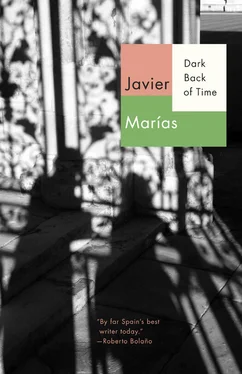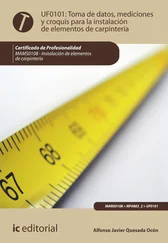“And tell me, how do you manage to keep that circle of glass you’re wearing in your eye from falling off?”
It was the type of thing likely to attract the dictator’s attention during that time, which was already beginning to settle down, though death still passed through it, and salt rained down and skulls were scattered: or rather it didn’t settle down, it was crushed underfoot, that time. His capacity for comment of any kind was virtually nonexistent; years later, after a series of tempestuous dances was performed for him and his guests by the flamenco dancer Antonio, and the dancer (avid for dictatorial congratulations or accolades) was brought to his box to receive his compliments, the best the usurper managed to say was, “Let’s see now. You look as if you’re made of rubber.”
De Wet knows very well that he must answer the question, though the time allotted for the audience is about to run out and four phrases about his smoked monocle could steer them irretrievably off the subject and use up the two or three minutes still granted.
“Oh, it’s a matter of practice, Excelencia . Training and discipline, as in all else. After a time the orbital muscles become so strong that in the end one doesn’t even remember the lens is there.”
“I see: effort,” the false admiral answers coldly, and De Wet realizes that the dictator was expecting something more along with the explanation, probably that he would take off and replace the monocle a couple of times without hesitation or error, giving an on-the-spot demonstration of his highly developed orbital muscles, but De Wet has no intention of baring his eye, not even for the Metropol, it’s a very intimate thing, nor does he expect the dictator to go so far as to ask him to do so, though he understands clearly now that such would be his desire; this is a man accustomed to being interpreted, unused to asking for or requesting anything; perhaps he is one of those people who only know what would please them once someone else has suggested it, formulating possible ideas for their cruelties or whims, all welcomed. Franco Bahamonde sits in silence again, for too many seconds, and De Wet seizes the opportunity to try to recuperate his partisans.
“So, what do you make of the plan, mi generali Does it strike you as feasible? Will you consider it? We could goad them incessantly, we would be a nightmare for the Soviet authorities, whose lives are too calm. They have crushed time itself underfoot, they have crushed those countries.”
But the fancy-dress sailor who never sailed except in pleasure boats is interested only in what’s in front of his eyes and in that alone, he may not even be aware of the mercenary’s puerile and senseless proposal, the moment the usher showed De Wet in he wrote him off as an arrogant European, an outlandish Englishman.
“And tell me,” he says at last, after the latest silence and with an absolute minimum of expression in his tiny and faintly grubby-looking eyes, “the earring: does it hurt? Because you’re wearing it pierced through the earlobe, aren’t you? It’s not a clip-on, it goes all the way through like a pin, doesn’t it? They’re called clip-ons, the kind that don’t pierce the ear, according to what I’ve heard on the radio. I listen to the radio quite a bit, to stay informed.”
De Wet instinctively takes his earlobe between thumb and index finger, his earring is a hoop, with no pendant, and indeed it does not clip on. He strokes his earlobe and strokes the hoop, again understanding by some process of infusion or mesmerism that the dictator wants not only a response but to see the ornament up close, as if to admire some minor phenomenon, no doubt it scandalizes and upsets him to see an earring worn by a man, but he also feels a minimal, indolent curiosity towards the thing he disapproves of, he wants to verify with his own eyes the degree of shamelessness attained by this pretentious individual who, on inexplicable recommendations, has wormed his way as far as the dictator’s office, heads will roll in the Ministry of the Interior and the embassies, Peman’s head will roll and so will Camilo’s, Starkie’s head will roll and also the heads of some lawyers and a maître d’. And his son-in-law’s head, too.
“Yes, señoría , I wear it pierced through the lobe, it’s an old military badge of my family’s,” De Wet tries to justify himself. “We are of South African origins, and down in South Africa it isn’t viewed as improper. It’s a family tradition, as I said, I maintain it out of loyalty. My grandfather used to put it on to win battles.”
“But your family are not negros,” says the dictator, staring hard at De Wet’s blond ponytail. “Not by your skin, you’re not negros.”
“No, we are not negros, Excelencia , as can be seen.”
“I’ve known negros,” Franco comments, pensively.
“I don’t doubt it, mi general. Su señoría must have travelled a great deal,” answers De Wet, ever more bewildered as to the direction the conversation is taking. He knows that from one second to the next the door will open and the usher will lead him out to the street, his partisans in limbo, the Hotel Metropol still confiscated.
“Travel, what you’d call travel, not so much,” acknowledges the impostor dressed as an admiral. And he adds, laconic, “I’m a man of experience. Negros can be seen from far away.” Then he falls silent again, but seems to be searching for words or for their proper order rather than signalling the end of his turn. Or perhaps he is trying to recall something very recent because he then repeats, “So, you say it doesn’t hurt, this trinket?”
“No, mi general , it doesn’t hurt, I’ve been wearing it since I was very young and again it’s a matter of getting used to it, our ears aren’t any different from women’s, are they?”
“It is true that they are similar. But that depends on how you look at it,” says the phony naval officer enigmatically, but there may be no enigma to it at all, just simplemindedness, and as he says it he lifts his thumb and index finger to one of his elephantine ears, as instinctively as De Wet just did, and De Wet realizes just how large Franco’s ears are — they look like the soles of feet set into his temples — and tries to imagine an earring embellishing one of them but immediately suppresses the disrespectful and revolting vision. The dictator keeps his neck stiffly erect, as if he were waiting for something, he’s almost seventy, very soon that neck will be wattled. He still has his feet, real feet, and so white, pressed down on the carpet, as if, instead of shoes, he were wearing a pair of steam irons. He gives the impression of not being prepared to stand or even sit up straight in his chair for anything in the world, so De Wet opts to move closer, turning to reveal his profile and inclining his torso slightly the better to show the mechanics of his trinket, which is not as intimate as the eye, it doesn’t bother him to give in to Franco on this.
“If Su Excelencia would like to see it in greater detail,” he said.
“Come closer. Closer,” the Chief of State orders in his always uninterested voice, stretching out the neck that will soon look like a turtle’s. De Wet turns even more to the side and leans closer, but between them is the large table, almost empty, the administration doesn’t spend much on paper. “Let’s see, come over on this side,” the dictator dictates, motioning him around the table, “I can’t quite make out this badge of war you speak of.” De Wet does as he is told and stands to the right of the general’s chair, and since the general has no thought of moving and De Wet is a man of some height, he kneels, in an agile motion, to place the ornamented ear at the proper altitude, that is, at the level of the hooded eyes that scrutinize the appendage which is now very close, it looks as if the dictator were whispering into the ear or were about to lick it, De Wet can feel Franco Bahamonde’s breath on his face like a steady, sibilant snore. “Let’s see now. You pierce your flesh, that must make a pulp of it,” says Franco as if he were issuing a decree. “I know negros pierce themselves, too. But not all of them. Moors, no; they don’t.”
Читать дальше












